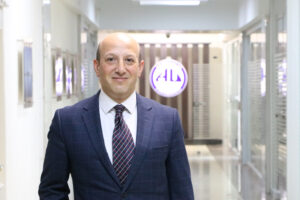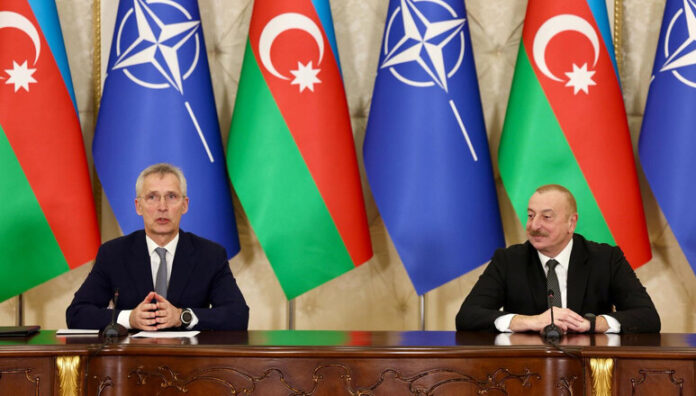By Prof. Kamran A. Behbudov
NATO Secretary General Yens Stoltenberg will visit Azerbaijan,Armenia and Georgia from March 17 to 19. According to the press service of the North Atlantic Alliance, he is now in Baku, where he will meet with the President of Azerbaijan, Ilham Aliyev. The next day NATO Secretary General will go to Tbilisi, where he will hold meetings with Georgian President Salome Zurabishvili and Prime Minister Irakli Kobakhidze. Finally, on Tuesday, March 19, Stoltenberg will be in Yerevan, where he will meet Armenian President Vaghan Khachaturian and Prime Minister Nikol Pashinyan.
Let’s look at these issues from two different analytical perspectives. The Caucasus is a zone of eternal instability, and perhaps a new front of conflict with Russia will open here. But the joining of the countries of the region to NATO is not on the agenda. There is another version of the visit: they will warn the post-Soviet republics not to go into conflict with Iran. Because as a result of the Azerbaijan-Armenia war, Turkey can gain access to the Caspian Sea through the Zangezur Corridor, which means the presence of NATO in the Caspian Sea. They can be used against Russia and Iran. Iran’s most serious competitor in the region is Azerbaijan. Azerbaijan has established serious diplomatic, commercial and military relations with Israel. It is quite possible that in the future Baku will become a place where the naval forces representing the interests of NATO and the Jewish state are stationed. Of course, there is another version here, but it is impossible to give an unequivocal answer to any of them.
Jens Stoltenberg’s visit can be considered a confirmation of NATO’s growing interest in the South Caucasus. There are examples of the Secretary General of NATO visiting countries that are not members of the Alliance, but are of interest to this organization. For example, we can mention Stoltenberg’s visit to Japan and South Korea in January 2023. As is known, Georgia is the country with the closest relations with NATO in the South Caucasus. In particular, in 2018, the country’s constitution was amended on full integration into NATO. Stoltenberg has already visited this country several times. As for Armenia, an additional factor in the alliance’s interest in this country is the coldness between Yerevan and the CSTO. NATO had this interest even before the Prime Minister of Armenia, Nakol Pashinyan, announced that his country had “frozen” its work in the CSTO. For example, Xavier Colomina, the special representative of the NATO Secretary General for the Caucasus and Central Asia, visited Yerevan twice in 2023 and in January 2024.
Stoltenberg first goes to Baku, then to Tbilisi, and finally to Yerevan. How can we explain this sequence? Perhaps, by starting the trip from Azerbaijan, Stoltenberg is trying to compensate for Javier Colomina not coming to Baku in January 2024. In addition, such a program of visits may be a signal of the possibility of a “thaw” between the USA (as a leading NATO player) and Baku at the end of 2023.
Of course, we can also express our views on Armenia’s withdrawal from the CSTO and its possible membership in NATO. In the near future, whether Armenia will officially leave the CSTO will be a matter of political negotiation with both official Yerevan, Moscow, and Western players. At the same time, the scenario of Armenia’s withdrawal from the CSTO is probably evaluated by France as an opportunity to increase its influence on Yerevan.
I would like to mention a few acts related to this topic. The statement from Yerevan that Russian border guards are no longer needed in “Zvartnots” is quite symbolic and requires an explanation. Thus, this is a more important signal than the termination of participation in the CSTO. Discussions about border guards show that Armenia can worsen the current level of bilateral relations.
Yerevan is trying to revise the current architecture of its foreign policy. To show its loyalty to the West, Armenia solves tactical issues and tries to take steps to distance Yerevan from Moscow.
To be more precise, we see a new attempt from Pashinyan’s team to change the geopolitical vector. Meanwhile, Nikol Pashinyan trusts France a lot.
Armenia’s serious efforts to establish relations with its neighbors in the region are also noteworthy. Most of Yerevan’s actions are related to its geographical location, Armenia is trying to integrate into logistics and other projects of Turkey and Azerbaijan.
Moreover, France’s failures in domestic and foreign policy do not stop. The protests on the eve of the Summer Olympic Games covered the whole country. Farmers oppose the government’s reforms in the agrarian sector, block the roads, and criticize the authorities.
The situation in foreign policy is no different from inside. The Elysee Palace, which was shamefully expelled from its once-colonial territories, was deprived of large revenues. The looting of colonies brought billions of dollars to the country’s budget, but it was also a matter of prestige. Now there is none of that. The main reason for the French bankruptcy is President Emmanuel Macron.
It has reached the point where the French flag is burned in the former colonies, and everything that reminds of it is destroyed. Its place is occupied by countries like Russia and Turkey. This upsets the Elysee Palace and makes it take opposite steps. This is why the campaign of total attack against both countries has started. For example, Paris threatens Russia by sending a military contingent of EU countries to Ukraine. Although this idea is described as an adventure in the Western countries, Macron is trying to get his word across. Pushing Russia out of Armenia is also part of this plan. As for Turkey, France is not able to fight openly. Being a NATO ally, Ankara’s influence and power do not allow this plan to be realized openly. He still hopes for Armenia. Paris strengthens the anti-Azerbaijani rhetoric in this country and openly supports the overthrow of the former separatist regime.
These and a number of other steps of Yerevan also bring up the hypothetical plans of Armenia for rapprochement with NATO.
Macron’s new target is the Caucasus and Central Asia. But will it be bought?
One of the most important issues in this direction is the attempt of Macron’s France to penetrate Central Asia. The main idea is that Ankara’s African policy violated the French colonial order. For this reason, Macron intervenes in the Ukraine-Russia war and tries to bring the Turkish states under his hegemony. Recently, he has been making remarkable statements in this direction. Turkey’s steps in Africa, political, military and commercial rapprochement with many countries, “win-win” tactics have made France an unwanted country in the region. After the disappointment in Africa, the French leader, whose plans were disrupted, changed his route to the Caucasus, as well as visited Kazakhstan and Uzbekistan.
Macron’s government suffered a heavy defeat against Turkey in Karabakh and Libya, and suffered serious losses against Turkish companies in the field of defense. These are facts. Speaking to the newspaper “Turkiyya” about the current situation, experts note that the Turkish army has seriously disrupted France’s game in Syria and Iraq. The French are also trying to incite Armenia and the South Caucasus to take revenge. France’s goal is a long war.
France wants to be Turkey’s neighbour by settling in Syria and Armenia. One of the most important goals of the French interest in the Caucasus is to divert Turkey’s attention from all energy and strategically important regions, especially the Mediterranean Sea. The fire that France wants to light will cause great damage to the Organization of Turkic States. Macron is trying to open new areas of exploitation. His visits to the Turkish republics should be evaluated in this context.
It should be noted that during Emmanuel Macron’s visit to Kazakhstan on November 1 last year, the issue of purchasing uranium was a priority. The importance of Kazakhstan for France, which provides 60 percent of its energy needs through Nuclear Power Stations, is also related to the fact that this country is rich in uranium. After the military coup in Niger, which is rich in uranium and supplies France, the importance of Kazakhstan has increased for Paris. In addition, since the start of the Russia-Ukraine war, Kazakhstan has become the third major supplier of fuel to Europe after the United States and Norway. France has invested 17 billion dollars in Kazakhstan’s economy and is among the five largest investor countries. Uzbekistan also seems interested in expanding cooperation with France. Last year, President Shavkat Mirziyoyev returned from a trip to France with a portfolio of contracts worth 6 billion dollars. Most of these contracts were related to the energy sector.
Thus, Macron, who does not ignore the development of Muslim and Turkish countries, is still grateful to the Turkish states. He wants to supply uranium from Central Asia. Let’s mention one fact that it is forbidden to transport uranium by air transport. Macron’s government is experiencing prejudice and enmity with the countries that own land routes. The main route connecting Central Asia and Europe is currently the Middle Corridor passing through Azerbaijan. If Macron supplies uranium from Central Asia, he will still need Azerbaijan, which he is targeting by supporting Armenia.
Thus, Macron and his team, who went on a “crusade” against Muslims in his country, are in a difficult situation. Otherwise, he would not have turned to the region located thousands of kilometers away – to the Muslim and Turkish states. It seems that he is trying to solve his problems through them. Looking at it this way, there is a way out of the problem. This way is also simple – one-sided policy should be abandoned and pragmatic policy based on state interest should be preferred, not personal interest. Otherwise, like in Niger, he will be kicked out everywhere he sets foot.
Author:
Prof. Kamran A. Behbudov, Vienna, Austria.







